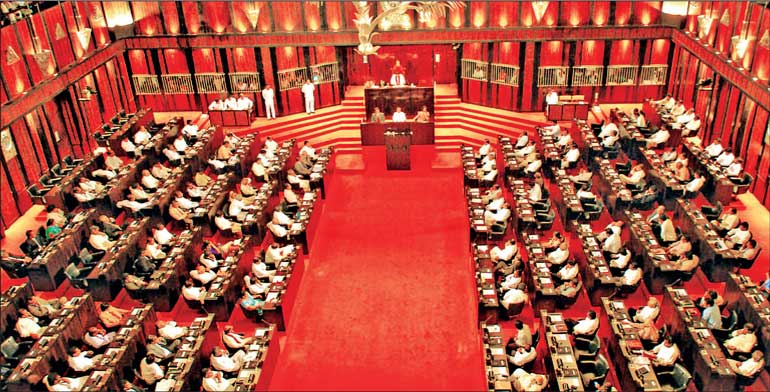Friday Feb 13, 2026
Friday Feb 13, 2026
Wednesday, 5 June 2024 00:26 - - {{hitsCtrl.values.hits}}

The challenge for the major political parties is to accept the concept and then work out any areas of contention, and areas of improvements
“Insanity is doing the same thing repeatedly expecting different results”
– Albert Einstein
 The concept of a legislated economic plan that incorporates economic parameters (or targets) is an opportunity to end 76 years of insanity. The challenge for the major political parties is to accept the concept and then work out any areas of contention, and areas of improvements. Opposing the concept is insanity and a disservice to future generations.
The concept of a legislated economic plan that incorporates economic parameters (or targets) is an opportunity to end 76 years of insanity. The challenge for the major political parties is to accept the concept and then work out any areas of contention, and areas of improvements. Opposing the concept is insanity and a disservice to future generations.
The Economic Transformation Bill is expected to provide for the National Policy on Economic Transformation and for the establishment of the Economic Commission of Sri Lanka, Investment Zones, Office for International Trade, National Productivity Commission, and Sri Lanka Institute of Economics and International Trade, and for the repeal of the Board of Investment of Sri Lanka Law No.4 of 1978 and other matters connected.
Citing an article in the Morning newspaper (https://www.themorning.lk/articles/ClyrSEziEo56ImhpaWuv): “The bill aims to transform Sri Lanka into a highly competitive and export-oriented digital economy by including diversification and deep structural changes of the national economy to boost competitiveness, achieving net zero by the year 2050, increasing integration with the global economy, achieving stable macroeconomic balances and sustainable debt, modernising agriculture to boost farmer productivity, farmer incomes, and agriculture exports, and promote inclusive economic growth and social progress. Achieving the targets set out by the Economic Transformation Bill has been assigned to the Cabinet of Ministers, which is charged with the direction and control of the Government of Sri Lanka.”
An observation of the Economic Transformation Bill, in conceptual terms, is that it is an imperative requirement to avoid economic mismanagement and grandiose schemes of various Governments that generally do not carry out costs benefits analysis, plunging the country into more and more debt and an unsustainable economy. It however appears to be mixing essential futuristic economic policy parameters which necessarily have to be long term, with methodologies of implementation which may need change in order to achieve these parameters.
Economic parameters
Additional economic parameters
Suggested additional economic parameters
1. The debt to GDP ratio not to exceed 75% of GDP. Reducing it to 95% by 2032 is a stated parameter, but the bill does not specifically set a maximum debt to GDP ratio to be achieved and maintained.
2. Government expenditure not to exceed 75% of income. Surplus funds to be credited to a “Futures Fund” to be used only for emergency expenditure.
A way forward
A possible way for greater cooperation amongst political parties on the way forward for economic transformation of the country could be if the current bill is presented as comprising two sections or even splitting it into two separate bills, with one being policy on economic parameters and the other being the methodologies of implementation:
1.The policy on economic parameters (or targets as has been mentioned and suggested)
2.Unless it has been mentioned in the Bill, the economic parameters or targets should not be changed by any government without a recommendation of the Parliamentary Committee on Public Finance and a 2/3 majority of members of Parliament. In addition, a reasonable period of time should be incorporated in the Bill to undertake public consultations prior to a vote in Parliament. Economic parameters have to be more sacrosanct and long term than methodologies.
Methodologies of implementation, such as establishment of the Economic Commission of Sri Lanka, Investment Zones, Office for International Trade, National Productivity Commission, and Sri Lanka Institute of Economics and International Trade, and for the repeal of the Board of Investment of Sri Lanka Law No.4 of 1978 and other matters connected.
Methodologies of implementation should be within the purview of governments in power as new governments with new faces and new thinking, and technology developments, changes in market conditions, among other reasons, may need changes to methodologies of implementation. If the suggested methodologies contained in the current Bill are working and delivering results, a new government should have the flexibility to continue with the methodologies, or make changes as needed or introduce new methodologies as needed.
Whilst not wishing to sound partisan, it needs to be said that the governing political combine led by President Wickremesinghe is the only political party or combine to present a way forward proposal for economic transformation of the country, whilst others have not even presented a discussion paper for the public to know their economic vision for the country. The only document on the table for discussion is the Economic Transformation Bill presented by the Government. While all political parties have the democratic freedom and right to take legal and democratic measures to oppose the Bill, they do not have the moral right to oppose it without presenting their own specific proposals as an alternative to what has been presented by the Government.
Hopefully, the suggestion made here that the Bill is looked at as two distinct sections or even separate Bills may provide all parties an opportunity to take specific legal measures to transform the economy.